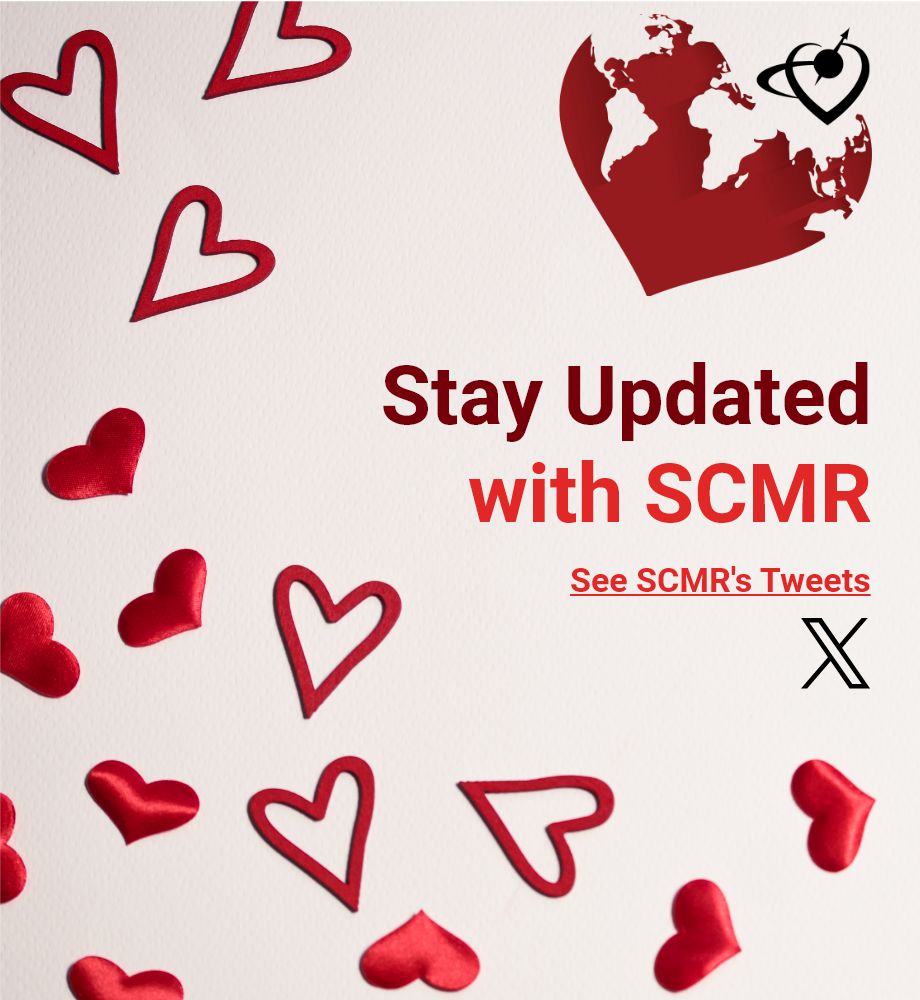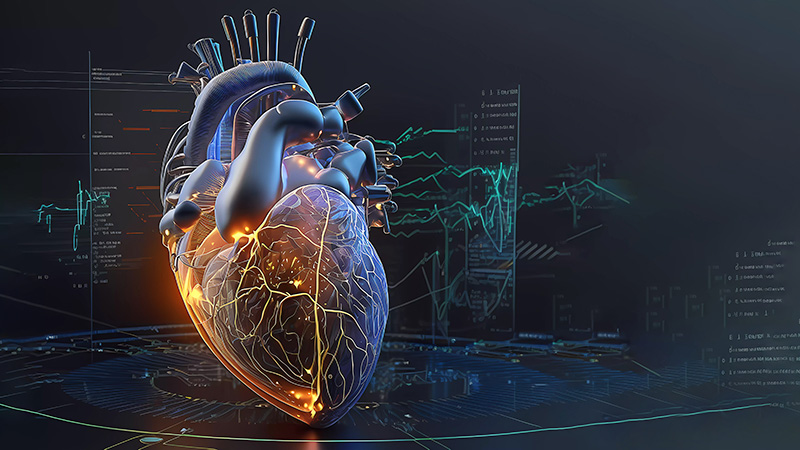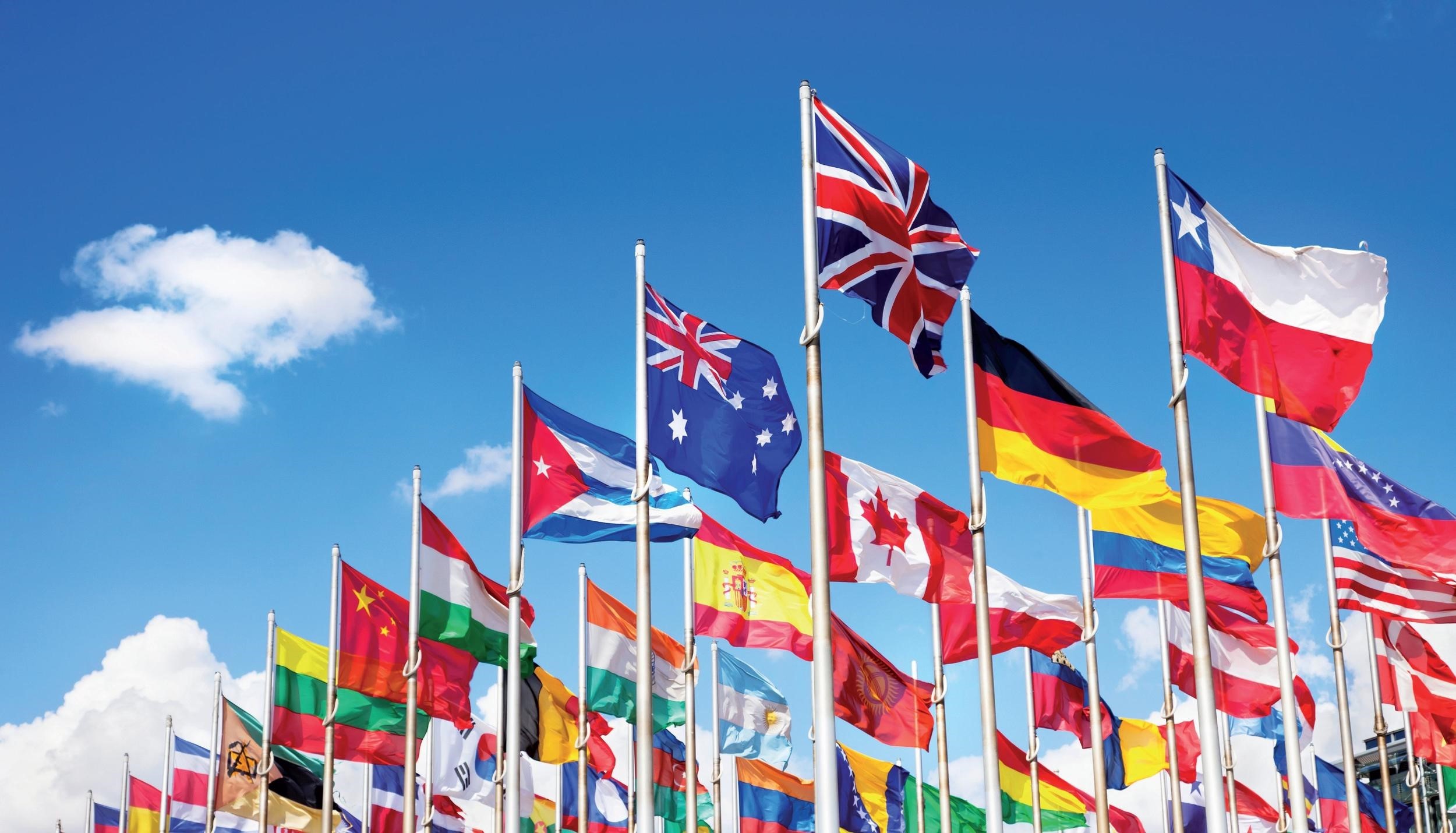
Baptist Medical Center Beaches, Jacksonville
The new Cardiac MRI program at Baptist Beaches opened its door on January 10th, 2025. This new site complements the already existing CMR program at the main hospital in Baptist downtown and adds more access to CMR in the Jacksonville community. Led by Dr George Dibu, a level 3 board certified cardiac MRI specialist from the Houston Methodist DeBakey Heart and Vascular center who had already built a successful CMR program previously, and supported by a great vision of the Baptist Health leadership, the new CMR program at Beaches has already performed more than 150 scans in less than 6 months. Given the growth and the strive to provide the most advanced cardiology care to the Jax Beach community, the Beaches hospital CEO Jarret Dreicer added a new state of the art second MRI machine side by side to the already existing advanced MRI machine providing greater and more robust access to Cardiac MRI improving early diagnosis, better monitoring of cardiovascular diseases and guiding treatment plans. Cardiac MRI at Baptist Beaches has rapidly become a site of excellence for high quality CMRs not only for the Baptist patients but for the entire community in Jacksonville.
With a strong commitment from the leadership, the support of all the Baptist Cardiology team and the strive of the CMR team to constantly improve, grow and provide the best CMR quality, this highlights how teamwork can lead to excellence and success with above all patient satisfaction and high-quality clinical care being the ultimate and only goal.
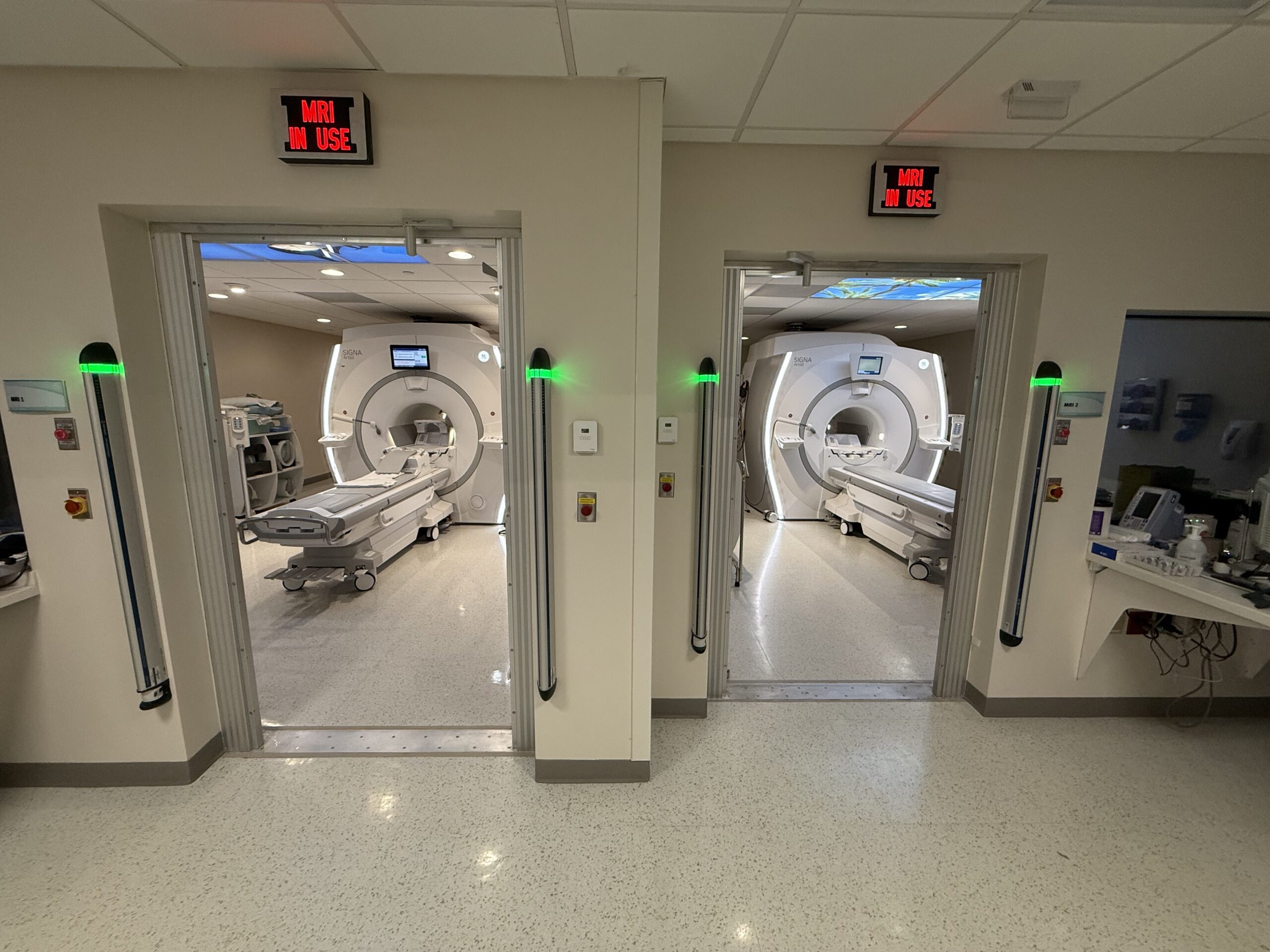 | 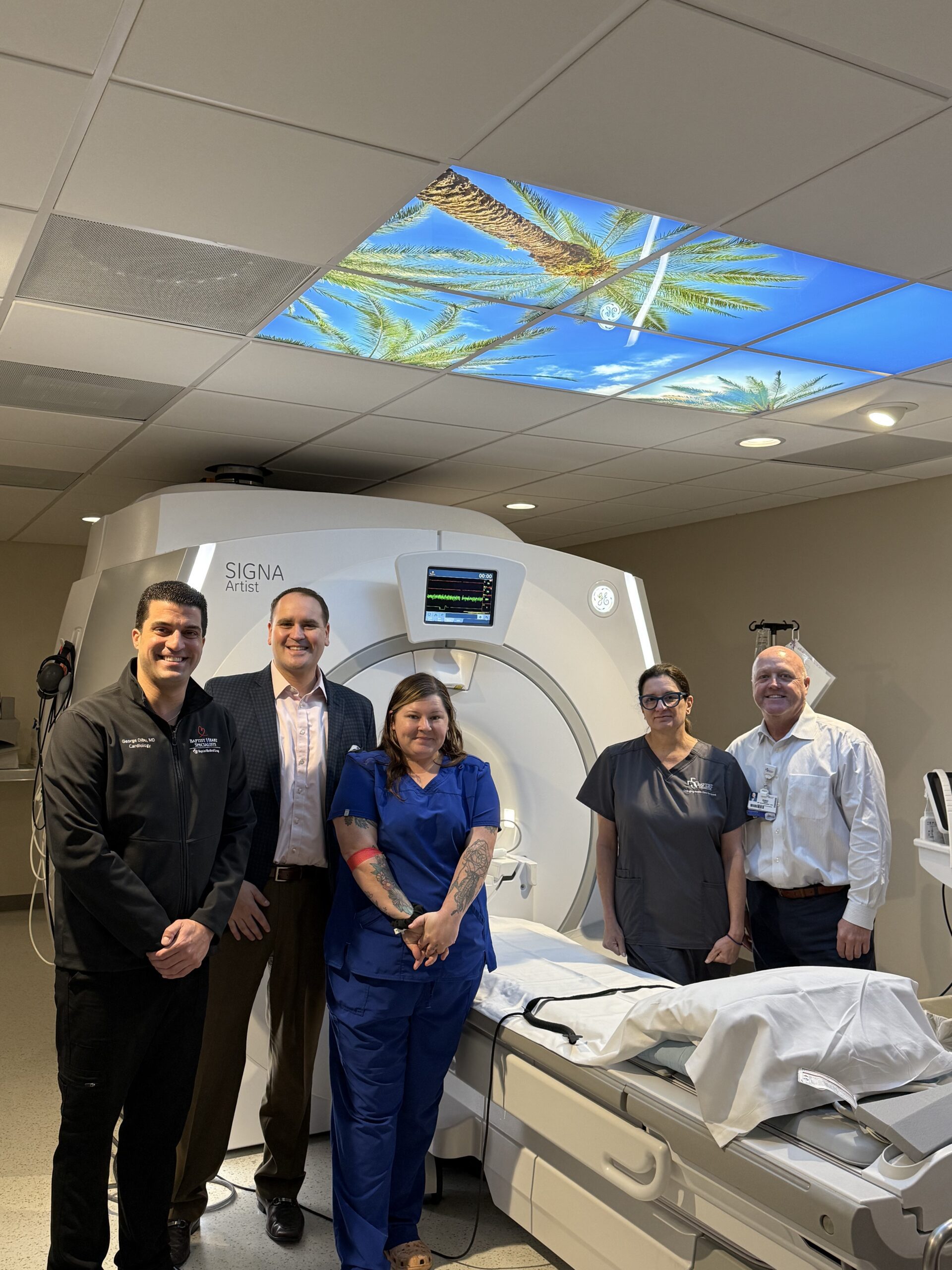 |
| Left: The two cardiac enabled MRI machines next to each other. Right: The first day of operation including Dr Dibu with the CEO and members of the clinical team. | |
CT Scanner Lomas Atlas
The facility, which is renowned for continuously updating state-of-the-art technology, was enhanced with a 512-slice cardiac tomography system, two magnetic resonance imaging scanners (1.5T and 3T) and cutting-edge cardiac imaging software.
With highly specialized technicians and cardiovascular imagers, the heart team is integrated by two radiologists, three adult cardiologists and one pediatric cardiologist thus making possible to perform all CMR techniques including scanning pediatric patients, stress CMR, imaging patients with devices as pacemakers, ICDs and prosthetic valves; and 4D Flow.
The center is part of a funded fellowship program in cardiovascular imaging including CMR and CT, endorsed by the National Autonomous University of Mexico (UNAM) including side by side teaching with a fully certified level 3 CMR expert.
CMR research in CT Scanner Lomas Altas is specially focused on 4D flow, valvular heart disease, congenital heart disease, ischemic heart disease, feature tracking/ strain and heart failure.
Additionally, in this center we perform more than 2,000 cardiac CT scans annually, including structural imaging and CCTA for evaluation of ischemic heart disease.
Contact information:
Victoria Torres Araujo, CMR consultant
Moisés Jiménez Santos, Head of cardiovascular imaging
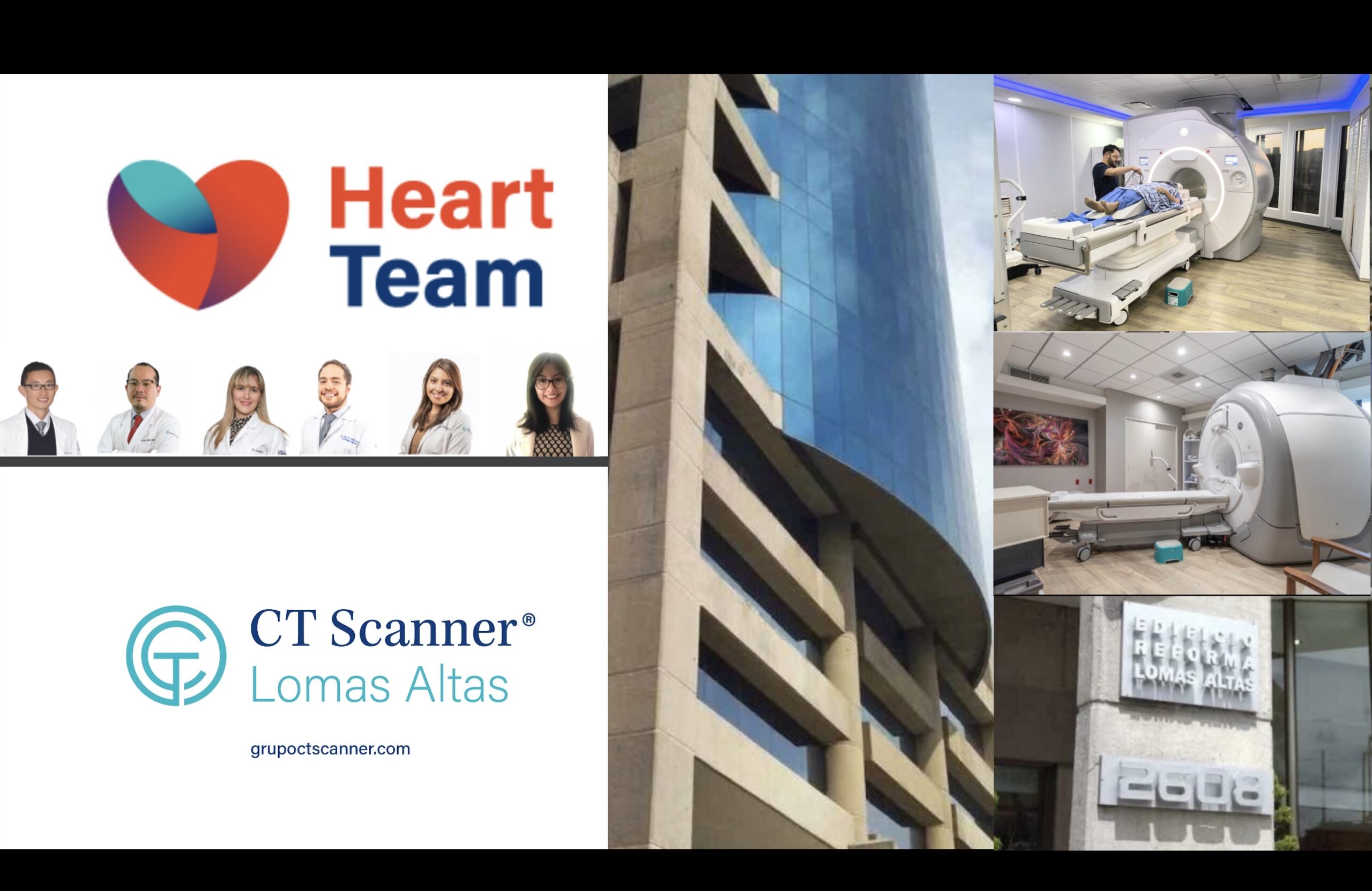
Top left: Heart Team at CT Scanner Lomas altas including the General Director, Dr Eric Kimura-Hayama, Dr Moisés Jiménez-Santos (Cardiologist-Head of the Heart Team), Dr Nelsy González – (Cardiologist), Dr Jorge Silva-Estrada (Pediatric cardiologist), Dr Ana María Rosas-Vázquez (Radiologist), and Dr Laura Victoria Torres-Araujo (Cardiologist CMR specialist).
Top right: 3T magnet with Carlos Olissner cardiac imaging technician, below imaging of the 1.5 T magnet both equipments available in the center.
St. Anne’s University Hospital in Brno, Czech
From July 2022, ICRC became a joint workplace of the St. Anne’s University Hospital and the Faculty of Medicine of Masaryk University (MU) in Brno. ICRC annually attracts new foreign researchers, students, or doctoral candidates to Brno city.
Research within ICRC is based on collaboration among experts within international multidisciplinary teams. For the center, the key is the integration of research, clinical practice, and medical education into a patient-centered approach. The aim is to drive innovation in healthcare, make discoveries in understanding the development and progression of human diseases, and enhance the prevention, diagnosis, and treatment of these conditions with a direct impact on healthcare.
Noninvasive Cardiac Imaging team is led by associate professor Roman Panovský. Team focuses on development of new protocols of heart imaging and identifying novel imaging biomarkers for the prediction of early myocardial dysfunction as well as myocardial perfusion and coronary artery disease, cardiac innervation and cardiac involvement in extracardiac diseases. Their main goals are:
- to test a novel CMR protocol to improve early detection of myocardial injury in Duchenne muscular dystrophy patients and DMD carriers
- to prove that CMR can detect higher prevalence and earlier stages of cardiac involvement in patients with sarcoidosis in comparison with commonly used methods
- to find novel CMR and laboratory markers for the diagnosis of cardiotoxicity in oncological group of patients after cardiotoxic chemotherapy
- development of new imaging protocols using lower administered activity of radiopharmaceuticals
- heart function in patients with Parkinson´s disease
- cardiac imaging data for machine learning
They process the data of 750 cardiac patients per year at MRI and 400 patients at SPECT.
The team collaborates on European Union-funded international research projects. We can name, for example, DataTools4Heart (funded by Horizon Europe, until 30.9.2026) and AI4HF (funded by Horizon Europe, until 31.5.2027), you can read more details about their work on AI4HF here, and national (CZ) research projects (e.g. Early surgical treatment and/or conservative treatment of patients with significant asymptomatic aortic regurgitation, until 31.12.2026).
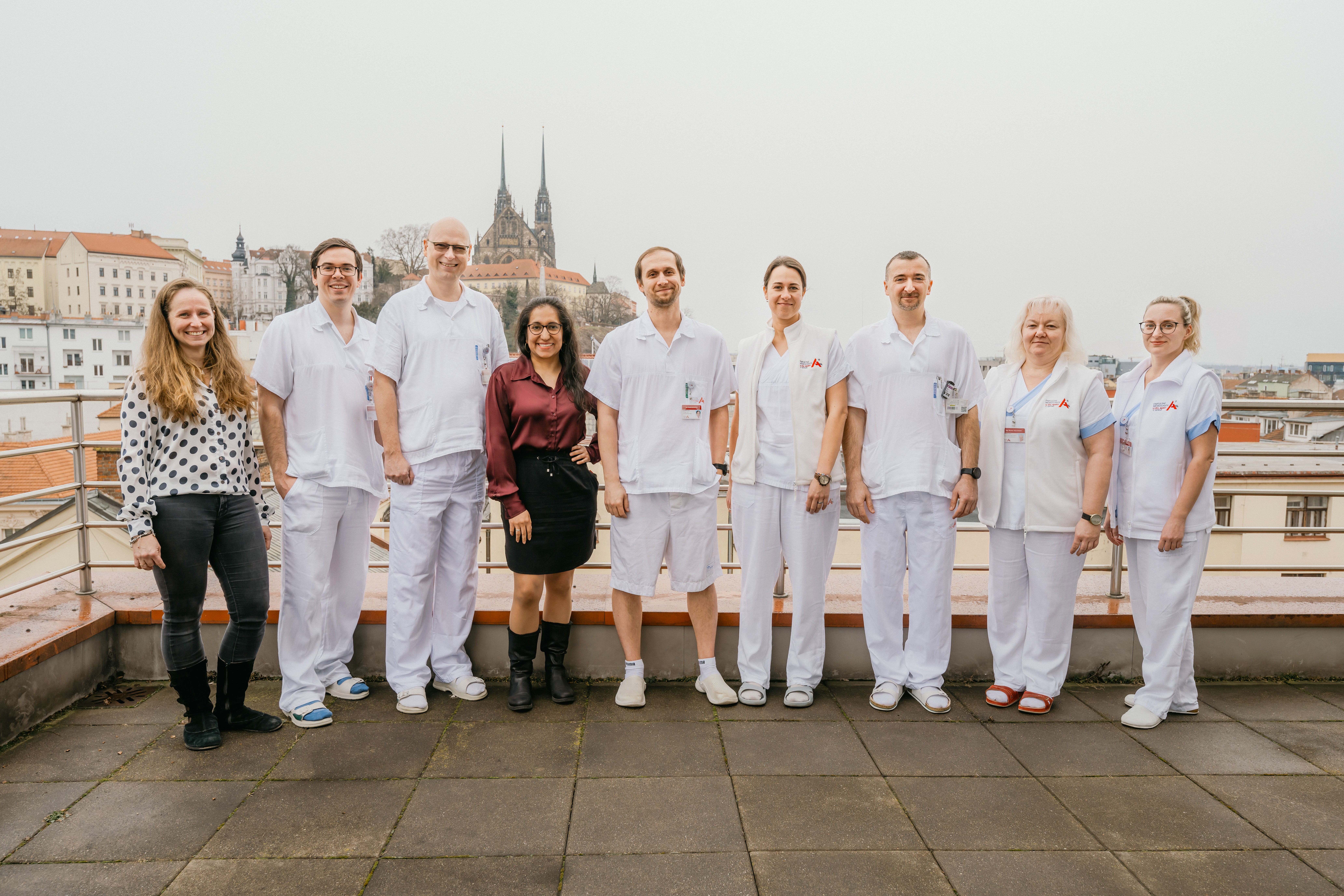
Image showing the team at International Clinical Research Center in Czech Republic, led by Dr Roman Panovský.
Radiologia Clinica de Campinas
Our clinical team has always worked with 3T CMR since our first scanner with that field strength, taking advantage from day one of the increased field strength in perfusion imaging, LGE sequences and coronary angiography. Despite that, low cost and efficient T2* imaging at 1.5T has also been one of our pet areas, with the clinic developing tools to facilitate access of the technology to other underdeveloped countries in the world while having open doors to patients who cannot afford the exam in Brazil. While we have since COVID significantly reduced our research focus, we continue to strive to offer our clinical patients the highest quality exams and access to the most recent technologies available worldwide in CMR.
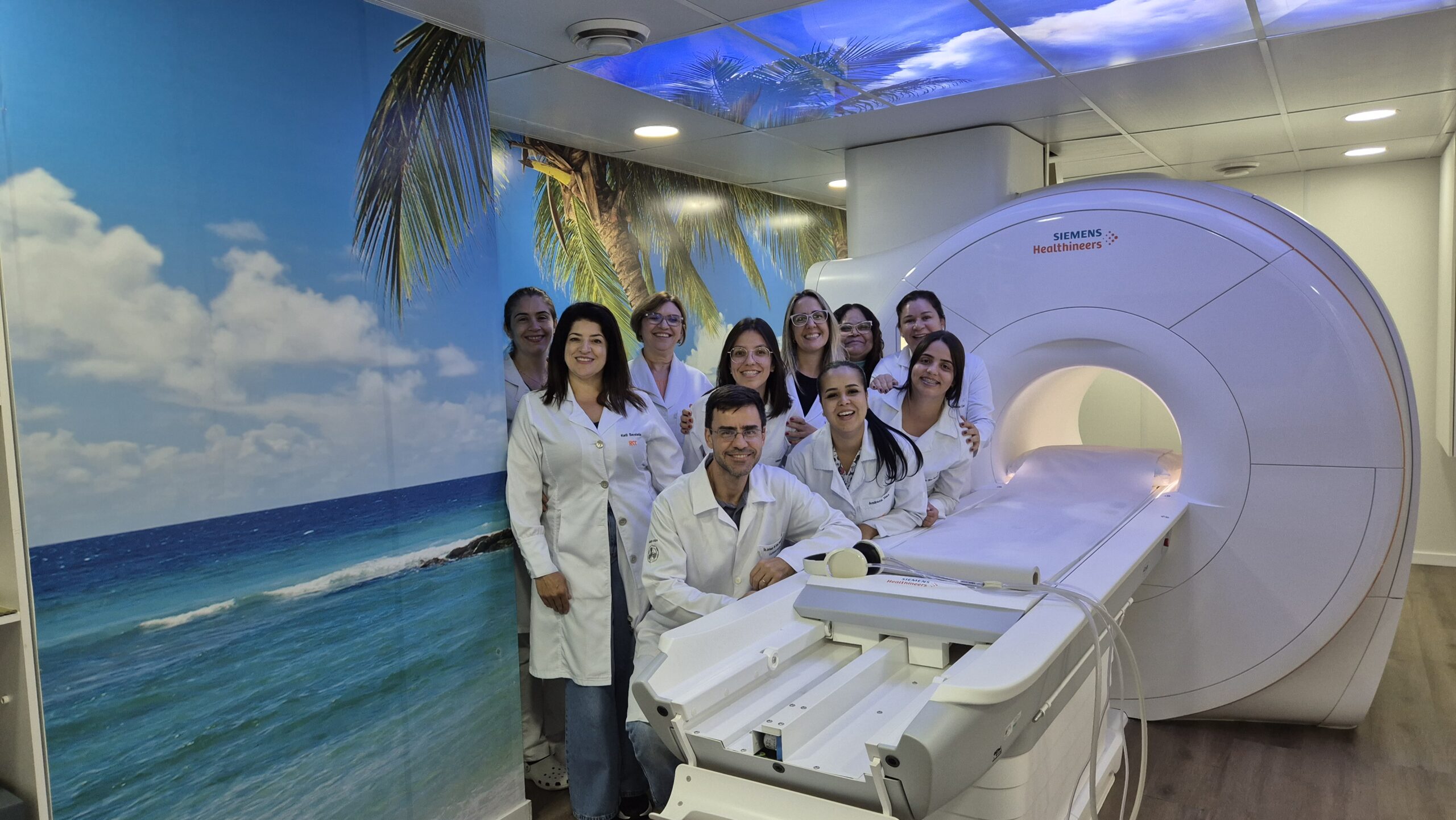 Image showing the team at Radiologia Clinica de Campinas, Brazil, with director Dr Juliano de Lara Fernandes. |
Onassis Hospital
It has state-of-the-art equipment and experienced medical staff. It stands out as one of the few centers in Greece offering Advanced Cardiothoracic Imaging (CMR, CT, SPECT-CT, Echo) for both adult and pediatric patients. The CMR service offers all CMR techniques, such as 3D whole heart imaging, 4D flow imaging with detailed hemodynamic assessment, imaging in patients with implanted cardiac devices, stress/perfusion scans and parametric tissue mapping.
The CMR service started in the Onassis Hospital in January 2022, and constitutes a joint service supported by both non-invasive Cardiology (Adult and Pediatric) and Radiology departments. We are a relatively new CMR unit, but the entire team has a long-standing experience on CMR covering the entire spectrum of techniques and analysis of data (more than 10 years of experience).
The Onassis Hospital CMR unit holds EACVI Laboratory Accreditation in Cardiovascular Magnetic Resonance and shares the following characteristics:
- Large numbers of patients/year: >1200 scans covering the entire pathology (for both children and adults)
- Full equipment: 1.5T Sola Siemens Scanner, Circle CMR42 software analysis and infrastructure for multiple users enabling a teaching friendly environment
- Covers the only Heart and Lung transplantation Unit in Greece and offers valuable help on early detection of graft rejection and graft vasculopathy
- It is one of the few centers in the Greek National Health system that provides CMR education on all cardiologists or radiologists in training, including the organisation of an annual Level 1 CMR SCMR approved meeting, which is offered for free to about 50 participants
- Has established collaboration projects with other centers abroad gathering validation data for sequences under development (Siemens collaboration centers)
- Has a weekly based educational program for Fellows and trainees
- Regular audit and support from a team of qualified radiographers (university degree) and physicists
- Three level 3 cardiologists (2 adult and 1 paediatric) with long standing experience (>10years) in CMR and high level of training in established centers in Europe and USA
CMR research at Onassis Hospital has a special interest in arrhythmias and imaging the arrhythmogenic substrate (for example VT corridors) to facilitate ablation procedures (a small-scale paradigm of digital twin technology)
At the same time, the digitalization of the Hospital’s services is progressing with the aim of creating a Smart Hospital, while artificial intelligence has also been integrated into daily medical practice to support medical decision-making and personalise treatment.
For any further information please contact Dr Eva Nyktari, Consultant in CMR and Cardiology Consultant and CMR Lead, via email: enyktari@ocsc.gr or Dr Thomas Vrachliotis, Head of Radiology, via email vrachliotis@ocsc.gr
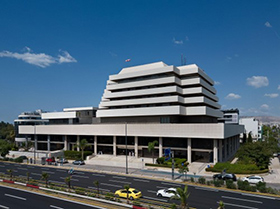 | 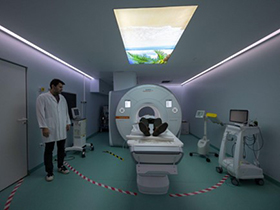 |
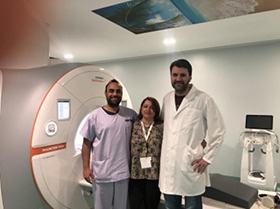 | 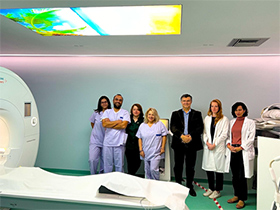 |
Images showing the Onassis Hospital in Athens, Greece, the CMR magnet and the team including radiographers, radiologists and cardiologists.
Leeds CMR Centre
CMR research in Leeds aims to develop and validate CMR methods and demonstrate their clinical impact. Our developments have in particular focused on myocardial perfusion CMR, 4D flow, Diffusion Tensor Imaging and MR spectroscopy and their application to coronary artery disease, congenital heart disease, heart failure and diabetic heart disease, with a developing interest in valve disease, cardio-rheumatology and cardiomyopathy.
The success of our team is based on our amazing radiographers, some with 25 years of CMR experience, nurses and support staff, our physicists, our many local and international fellows and a group of experienced CMR consultants. Over the past two decades we have had the pleasure of training dozens to doctors from all over the world in CMR and it is wonderful to see many of them now running their own CMR services. You can find more information on training opportunities in Leeds in the amazing SCMR Directory under Leeds CMR

Images from the Leeds team, including the last photo from their participation at the CMR2024 in London.
OCMR Oxford Centre for Clinical Magnetic Resonance Research
The Oxford Centre for Clinical Magnetic Resonance Research, OCMR is a premier unit within the Division of Cardiovascular Medicine, Radcliffe Department of Medicine at the University of Oxford. Established in 2001 and led by Professor Stefan Neubauer, OCMR is one of the world’s leading institutions in CMR, excelling in using Magnetic Resonance Imaging (MRI), Magnetic Resonance Spectroscopy (MRS) and Hyperpolarized 13C metabolic imaging to investigate diseases of the heart, liver, other abdominal organs, skeletal muscle, and the brain. Equipped with three state-of-the-art MRI scanners (1.5T and 3T from Siemens Healthineers, 3T from GE Healthcare) and an MR Hyperpolarizer (GE Healthcare), and access to a whole body 7T ultra-high field MR system (Siemens Healthineers), OCMR is designed for comprehensive clinical scans and research studies.
OCMR stands out as a hub that produces cutting-edge translational research by a highly multidisciplinary team built from collaborations between basic scientists, physicists, biomedical engineers, AI-machine learning computer scientists and clinician scientists from both the University and the National Health Service (NHS). Our team of over 60 researchers and support staff is dedicated to advancing knowledge and improving patient care through pioneering research. The proven track record of OCMR in translational-type research is evident from the publication of >700 manuscripts, many in high impact journals, with multiple contributions to clinical guideline documents. We have trained over 60 PhD (DPhil) students, who have won over 40 young investigator awards. This dynamic collaboration fosters the development of innovative, non-invasive imaging techniques that enhance our understanding of disease mechanisms and diagnostic imaging, addressing some of today’s most pressing health challenges.
Our research themes encompass a wide array of topics, from technical MR method development, quantitative parametric mapping methods, hyperpolarized imaging, high field (3T) and ultra-high field (7T) MRS, advanced image analysis techniques, AI and machine learning approaches to clinical investigations into cardiomyopathies, myocarditis, ischemic heart disease, valvular heart disease, heart failure, diabetes, obesity, liver disease, chronic fatigue syndrome, and multiple sclerosis. OCMR also partners with other research groups, within the UK as-well-as internationally, to bolster clinical studies and registries (such as the large international hypertrophic cardiomyopathy registry or HCMR) using advanced MRI techniques. We also play an important role in co-leading CMR for the UK Biobank Imaging study aiming to scan 100,000 individuals across the UK.
OCMR offers training in all established basic and advanced clinical CMR imaging applications (e.g. standard imaging planes, cine imaging, volume analysis, late gadolinium enhancement, stress perfusion and ischaemic heart disease, assessment of non-ischaemic cardiomyopathies, cardiac masses and tumours, assessment of valvular heart disease, assessment of aortic disease, parametric mapping, and congenital heart disease), as-well-as in CMR imaging research tools like hyperpolarized imaging and MRS.
In close collaboration with the NHS, OCMR provides CMR scans to patients from the Oxford University Hospitals NHS Foundation Trust and many other NHS hospitals. Recognized as a BUPA accredited Cardiac MRI unit, we also serve numerous private healthcare providers. Our expertise means that we are a reference center for other CMR units, and provide advice and specialized scanning for complex patients.
Over the past 23 years, our work has been supported by prominent funding bodies, including the British Heart Foundation (BHF), the National Institute for Health and Care Research (NIHR), the Medical Research Council (MRC), and the Wellcome Trust.
Stay tuned for more updates and breakthroughs from OCMR, where innovation meets excellence in cardiac imaging research.
 OCMR Group Photo July 2024  The Radiography Team with Director of OCMR, Professor Stefan Neubauer (centre), Lead Radiographer, Rebecca Mills (far right), Miriam Lacharie (second from right), Arun Muyyayil (second from left) and Neil Fox (far left). |
Baylor Scott & White, The Heart Hospital Plano
Baylor Scott & White, The Heart Hospital – Plano, TX is a premier tertiary comprehensive cardiac care center renowned as one of the busiest and highest-rated heart hospitals in the United States. You can find it listed at the SCMR Center Directory here.
Over the past two years, the Cardiac MRI (CMR) program has experienced significant growth, with the annual volume of CMR studies increasing from 500 cases to 2,540 cases. This remarkable expansion has established the center as the busiest CMR facility in the Dallas Metroplex and North Texas.
The success and growth of the CMR program is attributed to optimization of scan length and quality, implementation of high-caliber reporting, and heightened community awareness regarding the value of CMR in cardiac care. Additionally, the center is among few in the region offering stress CMR and accommodating both MRI-conditional and non-conditional implantable devices.
The routine CMR scans encompass a diverse range of adult cardiac conditions, including ischemic and nonischemic cardiomyopathy, hereditary cardiomyopathy complex valvular heart disease and arrhythmia management.
The CMR program is managed by a team of specialized imaging cardiology faculty. The hospital is equipped with a 1.5 T Philips Achieva scanner and is currently installing a second 1.5 T Siemens Sola scanner, specifically tailored for cardiac imaging with plans to add a 3rd dedicated scanner at a new hospital site in 2025 to accommodate the growing CMR needs.
The center also boasts a robust clinical research institute supported by dedicated research staff. It actively participates in numerous multicenter trials and registries focused on cardiac and vascular surgery, valvular heart disease, and heart failure.
Additionally, the hospital performs a high volume of approximately 15,000 cardiac CT scans annually, including coronary CT angiography (CCTA), structural cardiac CTs, and peri-operative imaging for complex cardiac surgeries.
Contact information:
Dr. Amro Alsaid: amro.alsaid@bswhealth.org
Medical Director, Cardiac MRI and Cardiac CT programs
|
Complejo asistencial Sotero del Río | CASR
SR Hospital has advanced cardiac imaging capabilities, including a cutting-edge 1.5 Tesla MRI, a 128-slice cardiac tomography system, and a SPECT-CT.
It stands out as one of the few centers in the county offering comprehensive Cardiac Magnetic Resonance (CMR) services for adult and pediatric patients. These services encompass all CMR techniques, such as 4D Flow with advanced hemodynamic quantification, imaging of cardiac implant patients (ICD, pacemakers, mechanical valves), stress vasodilator CMR, and Mapping.
The group conducts approximately 900 CMR studies and 1800 cardiac CT scans (coronary and structural) annually. The multidisciplinary team includes highly skilled technicians, a level III Radiologist, two adult level III Imaging Cardiologists, and three pediatric imaging cardiologists who have overseen a dedicated congenital heart disease program since 2011.
The team plays a pivotal role in advancing the fields of cardiology and radiology. We actively collaborate with researchers and engineers and are deeply involved in the education of cardiology and radiology fellows.
Furthermore, the adult section participates in an inherited cardiac conditions clinic, providing specialized cardiology care tailored to a broad spectrum of cardiomyopathies. This integration allows us to offer precision cardiology services to our diverse patient population from neonatal to adulthood as part of the lifelong evaluation.
A new hospital nearing completion (see photo below) promises a substantial boost to our capabilities. This state-of-the-art facility will be the biggest hospital in Chile, with nearly 1000 beds. It will house three advanced MRI systems equipped with full cardiology capabilities, including hybrid CMR and Cardiac Catheterization facilities, significantly increasing our capacity and solidifying our center’s position as a premier provider of cardiac imaging in our region.
| ADULT CARDIAC IMAGING Jesús Urbina Romero (RAD) Julián Vega Adauy (CARD) Marcelo Luque González (CARD) | PEDIATRIC CARDIAC IMAGING Lidia Toro Rosas (PED-CARD) Myriam Ferreiro Campbell (PED-CARD) Carmen Luz López Leiva (PED-CRAD) |
 Photos: Top left the CMR team including cardiologists, radiologists and technologists. Top right is the joint adult and pediatric cardiac imaging team case discussion, from left to right: M Luque, J Vega, C Lopez, L Toro, J Urbina, and M Ferreiro. Bottom image is the new hospital currently under construction which will house 3 CMR scanners. |
CONTACT INFORMATION: Julián Vega Adauy, jvega@incic.org | @ecocardio_cl
Rajaie Cardiovascular Medical and Research Institute
There is also an active fellowship program enabling 18 months of training, 12 months in CMR and 6 months in cardiac CT. It is open each year to cardiologists and radiologists who have finished their general training.
Contact information for anyone interested:
Dr Hamid Reza Pouraliakbar; hamidpou@yahoo.com
Dr Golnaz Houshmand; golhoush@gmail.com
 Photo of the CMR team at Rajaie Cardiovascular Medical and Research Institute |








